Badge of Honour 06 - The Murderers (50 page)
Read Badge of Honour 06 - The Murderers Online
Authors: W.E.B Griffin

His whereabouts, the Chief was forced to inform the Mayor, were unknown. When he had not come out of his house to go to work when he was supposed to, Detectives Milham and Payne had gone to his door and rung the bell.
His mother had told him that she was worried about John Francis. He had gone out the night before and not returned. He rarely did that. If he decided to spend the night with a friend, Mrs. Foley reported, he always telephoned his mother to tell her. John Francis was a good boy, his mother said.
“You’re telling me you don’t know where this scumbag is?” the Mayor asked.
“Well, we know he’s not at the Wanamaker’s warehouse,” Lowenstein, more than a little embarrassed, reported. “We’re working on known associates.”
“Speaking of known associates, you do have an idea where Mr. Atchison is right now, don’t you?”
“The Media police are watching his house. He’s there.”
“Find Foley, Matt,” the Mayor ordered. “Soon.”
“Yes, sir.”
“Why don’t you call the police?” the Mayor said, his sarcasm having been ignited. “Maybe he got himself arrested. Or check the hospitals. Maybe he got run over with a truck. Just find him, Matt!”
“Yes, sir.”
Chief Lowenstein replaced the pay telephone in Meagan’s Bar into its cradle. He looked thoughtful for a moment, and then asked himself a question, aloud.
“Why the hell not?”
He dropped another coin in the slot, dialed a number, and told the lieutenant who answered to call the hospitals and see if they had a patient, maybe an auto accident or something, named John Francis Foley. And while he was at it, check the districts and see if anybody by that name had been arrested.
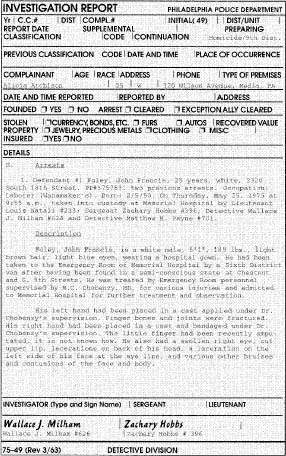
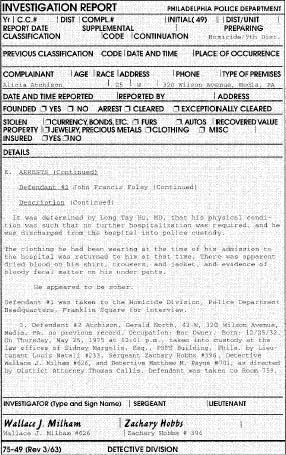
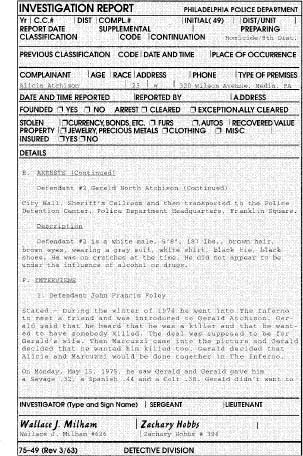
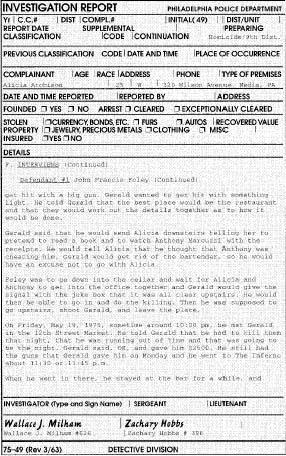
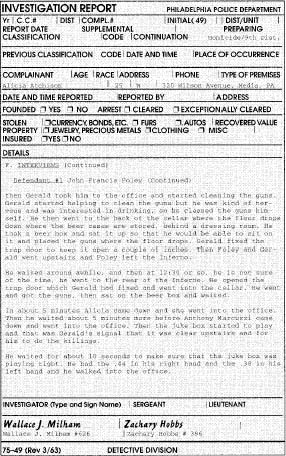
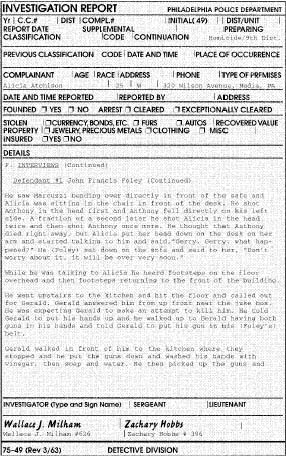
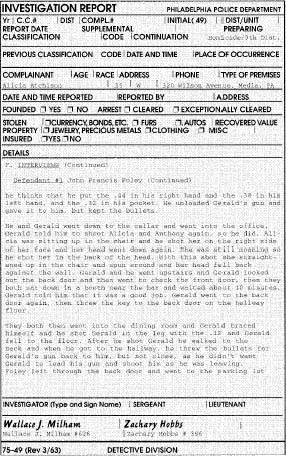
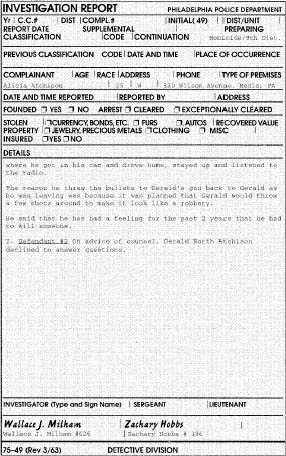
Option one, of course, was that he would personally assume the responsibility for prosecuting the case. He knew that if he did that, in addition to the satisfaction he knew he would feel if he was able to cause the full weight of the law to come crashing down on the miserable little sonofabitch, there would be certain political advantages.
The trial was certain to attract a good deal of attention from the news media, print, radio, and television. The good people of Philadelphia could not avoid being made aware time and time again that their district attorney was in the front lines of the criminal justice system, personally bringing a terrible person, a cop killer, to the bar of justice.
The problem there was that there was a real possibility that he might not be able to get a conviction. The fact that there was no question Leslie had brutally shot Kellog to death was almost beside the point here. What was necessary was to get twelve people to agree that not only had he done it, but that he knew what he was doing when he did.
Leslie had asked for, and had been provided with, an attorney from the public defender’s office immediately after being advised of his rights under the Miranda decision.
That fellow practitioner of the law had turned out to be a somewhat motherly-appearing woman, who had spent seven years as a nun before being released from her vows and going to law school.
She had promptly advised Mr. Leslie to answer no questions, and he had not. Tony Callis had often watched the attorney in question (whom he very privately thought of as That Goddamned Nun) in action, and had come to have a genuine professional admiration for both her mind and her skill. He also believed that she had a personal agenda: She truly believed that murder was a sin, and that the taking of life by the state, as in a sentence to the electric chair, was morally no different from what Leslie had done to Kellog.
Her strategy, Callis thought, would be obvious. She would first attempt to plea-bargain the charge against Leslie down to something which would not result in the death penalty.
Callis could not agree to that, either, from rather deep personal feelings that a cop-killing under any circumstances undermined the very foundations of society and had to be prosecuted vigorously to the full extent of the law. And also because he did not want to see headlines in the
Bulletin
, the
Daily News
, and elsewhere telling the voters he had agreed to permitting a cop killer to get off with nothing more than a slap on the wrist.
When the case then came to trial, That Goddamned Nun, oozing Christian, motherly charity from every pore, would with great skill try to convince the jury that he hadn’t done it in the first place—and Callis knew his case was mostly circumstantial—and if he had, he was a poor societal victim of poverty, ignorance, and neglect, which had caused him to seek solace in drugs, and he hadn’t known what he was doing, and consequently could not be held responsible.
The headlines in the
Bulletin
, the
Daily News
, and elsewhere would read, “DA Fails in Cop Killer Case; Leslie Acquitted.”
Option two was to have one of the assistant DAs take the case to court. In that case it was entirely possible that the Assistant DA would get lucky with a jury, who after ten minutes of deliberation would recommend Leslie be drawn and quartered, and the Assistant DA would get
his
picture in the papers and on the TV, and people would wonder why Callis hadn’t done the job he was being paid for.
Inasmuch as he had yet to weigh all the factors involved and come to a decision, Tony Callis was more than a little annoyed when his secretary reported that Inspector Peter Wohl, Staff Inspector Mike Weisbach, and Detective Matthew Payne were in his outer office and sought an immediate audience
in re
evidence in the Leslie case.
On general principle, Callis had them cool their heels for five minutes during which he wondered what the hell Wohl wanted—the Leslie case was a Homicide case—before walking to his door and opening it for them.
“Peter,” he said. “Good to see you. Sorry to keep you waiting.”
“Thank you for seeing us.”
“Mike,” Callis went on, shaking Weisbach’s hand, and then turned to Payne. “Nice to see you, too. Give my best to your dad.”
“Thank you, sir, I will.”
“Now what can I do for you?”
“This is confidential, Mr. Callis,” Wohl said. “We would appreciate it if what we say doesn’t get out of your office.”
“I understand.”
“Mike, show Mr. Callis the pictures,” Wohl ordered.
Weisbach handed Callis a thick manila envelope.
“The first ones are the photographs Homicide had taken in Leslie’s backyard,” Weisbach said. “They show the photo of Officer Kellog and the tape cassettes in the garbage pile.”
“I’ve seen them.”
“Next are individual photographs of each cassette, taken this morning in the Forensics Lab.”
Callis flipped quickly through the 8-by-10-inch photographs of the individual cassettes. Each bore a legend stating what was portrayed, and when the photographs were taken.
“OK,” Callis said. “So tell me?”
“We have an interesting thing here,” Weisbach said. “The cassettes are evidence in the Leslie case. They may also, down the line, be evidence in other cases.”
What the hell is he talking about?
“I’m afraid I don’t understand, Mike.”
“This is what is confidential,” Wohl said. “The Widow Kellog appeared at Jason Washington’s apartment and announced that the entire Narcotics Five Squad is dirty. She went so far as to suggest they were responsible for her husband’s murder.”
“We know now, don’t we, Peter, that’s not the case?”
“We know that Leslie murdered Officer Kellog. We don’t know if anyone in Narcotics Five Squad is dirty.”
“Peter, the gossip going around is that Mrs. Kellog…how should I put it?”
“Mrs. Kellog was estranged from her husband,” Wohl said.
“…and—how shall I put it—‘
involved
’ with Detective Milham. I’m sure that you have considered the possibility that she just might have been…how shall I put it?”
“‘Diverting attention from Milham’?” Wohl suggested. “She received a death threat. A telephone call telling her to keep her mouth shut, or she’d get the same thing her husband did.”
“Oh, really?”
“And she told Washington that her husband bought a condo at the shore, and a boat, both for cash. Very few police officers are in a position to do that. Mike has already checked that out. They own a house and a boat.”
It was obvious that Callis was not pleased to hear of this new complication.
“Isn’t this sort of thing in Internal Affairs’ basket? And what’s it got to do with the tapes, in any event?”
“I wish it was in Internal Affairs’ basket,” Wohl said. “But I had a call this morning from the Commissioner, who gave it to Special Operations.”
“You really are the Mayor’s private detective bureau, aren’t you?” Callis observed. When Wohl did not reply but Callis saw his face tighten, Callis added: “No offense, Peter. I know you didn’t ask for it.”
“We have reason to suspect,” Weisbach said, “that these tapes are recordings made by Officer Kellog of telephone calls to his home. If that’s the case, they may contain information bearing on our investigation.”
“They may
have
contained anything,” Callis said. “Past tense. They’re burned up.”
“The Forensics Lab thinks maybe they can salvage something,” Weisbach said.
“What we would like from you, to preserve the evidence in both cases,” Wohl said, “is permission to have Forensics work on them. Photographing each step of the process as they’re worked on.”
“Destroyed is what you mean,” Callis said. “If I was going to be in court with the Leslie case, I’d want to show the jury the tapes as they were in the fire, the actual tapes, not what’s left after Forensics takes them apart.”
Wohl didn’t reply, and Callis let his imagination run:
“A good defense attorney could generate a lot of fog with somebody having fooled around with those tapes,” he said, and shifted into a credible mimicry of Bernadette Callahan, Attorney-at-Law, formerly Sister John Anthony:
“‘What were you looking for on these tapes? Oh, you don’t know? Or you won’t tell me? But you can tell me, under oath, can’t you, that you found absolutely nothing on these mysterious tapes that you examined with such care that connected Mr. Leslie in any way with what you’re accusing him of.’
“And then,” Callis went on, “in final arguments, she could make the jury so damned curious about these damned tapes that they would forget everything else they heard.”
“They gave him the Nun to defend him?” Weisbach asked, smiling.
“She probably volunteered,” Callis replied. “She has great compassion for people who kill other people.”
“Tony,” Wohl said. “I need those tapes.”
That’s the first time he called me by my first name. Interesting
.
“I know that…”
“If I have to, I’ll get a court order,” Wohl said.
I’ll be damned. He means that. Who the hell does he think he is, threatening the District Attorney with a court order?
The answer to that is that he knows who he is. He’s wrapped in the authority of the Honorable Jerry Carlucci
.
“Come on, Peter, we’re friends, we’re just talking. All I’m asking you to do is make sure the chain of evidence remains intact.”
“Detective Payne,” Wohl said. “You are ordered to take the tapes from the case of Officer Kellog from the Evidence Room to the Forensics Laboratory for examination. You will not let the tapes out of your sight. You will see that each step of the examination process is photographed. You will then return the tapes to the Evidence Room. You will then personally deliver to Mr. Callis (a) the photographs you will have taken and (b) the results, no matter what they are, of the forensics examination.”
“Yes, sir,” Matt said.
Wohl looked at Callis.
“OK?”
“Fine.”
“Thank you, Tony.”
“Anytime, Peter. You know that.”
